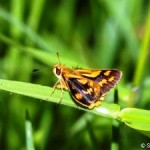
As part of his latest conservation initiative, The Duke of Cambridge brings together an unprecedented collaboration between the Royal Foundation of The Duke and Duchess of Cambridge and Prince Harry, and seven of the world’s most influential conservation organizations, including IUCN.
The partnership, named ‘United for Wildlife’, is a long-term commitment to tackle global threats to the world’s natural resources, including illegal wildlife trade.
“The threats to our natural heritage are extensive, but I believe that this collaboration of the best minds in conservation will provide the impetus for a renewed commitment and action to protect endangered species and habitats for future generations,” says His Royal Highness, The Duke of Cambridge.
“At the root of the illegal wildlife trade, for example, is the demand for products that require the deaths of tens of thousands of these animals every year, pushing them further towards extinction. We must work together to prevent this catastrophe and allow our children the opportunity to experience wildlife in its many beautiful and varied forms.”

The collaboration’s initial work will focus on the illegal wildlife trade. The Wildlife Trade Monitoring Network TRAFFIC, a joint programme of IUCN and WWF, is currently preparing a report for the partnership on the overall state of illegal wildlife trade, and options for bringing it under control. IUCN, through its Species Survival Commission (SSC), will bring to the partnership its expert knowledge on species in relation to wildlife trade. IUCN is a key player in driving changes in legislation and implementing conservation programmes to secure the future for heavily traded species such as Elephants, Rhinoceros and Pangolins.
“We feel honoured to have the opportunity to work with His Royal Highness on what is possibly the most serious threat that some of our planet’s rarest species face today,” says Simon Stuart, Chair of IUCN SSC. “We’re currently witnessing an unprecedented rise in illegal wildlife trade, with its value running into hundreds of millions of dollars. Wildlife trafficking also has serious security, economic, political and ecological ramifications. We look forward to sharing our expertise on this burning issue.”

‘United for Wildlife’ also aims to raise awareness of conservation crises, focusing particularly on engaging the next generation of conservation leaders. This will include providing career support to young professionals around the world, which will be backed by IUCN’s Commission on Education and Communication (CEC).
“For 21st century conservation to succeed, we need the young generation – their new thinking, new energy and new ways to communicate,” says Juliane Zeidler, Chair of IUCN CEC. “For us, engaging a new generation in a direly-needed renewed conservation effort is of great value.”
The conservation organizations partnering the Royal Foundation for United for Wildlife alongside IUCN are: Conservation International, Fauna and Flora International, The Nature Conservancy, Wildlife Conservation Society, WWF-UK and the Zoological Society of London – all Members of IUCN.
Source: IUCN.














